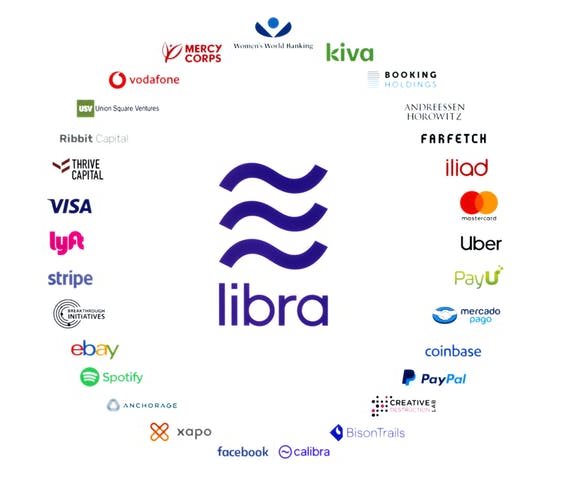Facebook's Libra has staggering potential - state control of money could end

Yet the latest addition to this group, Facebook’s Libra, threatens to do something that no other cryptocurrencies have come close to achieving: the state monopoly over the control and issuance of money is now under serious threat.
Facebook boasts over half the world population as active monthly users: 2.2 billion on Facebook, 0.8 billion on Instagram and 0.7 billion on WhatsApp. Combined with the fact that 1.7 billion adults worldwide have no bank accounts, a project like this is the perfect petri dish in which to create a truly global currency.
The Libra Council
The independent Libra Council that Facebook proposes to oversee this new currency from Geneva will become nothing short of a quasi central bank. Consisting of 27 giant corporates plus Facebook, it will vet aspiring applicants who wish to join their ranks for a fee of US$10m (£7.9m); as well as manage the reserve of state currencies and short-term government bonds that will back the Libra.

This model is very different to the likes of bitcoin, whose exchange rate is driven purely by the supply and demand. In contrast, the Libra Council would be competing in global currency wars against other nation states.
Imagine 10 years from now if, say, 40% of all US dollars are held on deposit by Facebook/the council to back the issued Libra coins, which have by now become widely used across the world. We can hypothesise that US dollars might constitute a 30% weight of Libra’s asset-backing basket – to have a steady exchange rate for Libra, the idea is to underpin it with a selection of stable and widely traded financial assets.
In the likely event that the US experiences a moderate, or even severe economic crisis, Facebook/the council would need to rebalance the basket of assets to defend the value of Libra. Let’s say they decided to revise down the US dollar weighting in their reserve to 25% of the basket. This would involve selling huge sums of US dollars and replacing them with, say, euros, and would significantly drive down the value of the dollar.
This would be a very negative market signal, encouraging other holders of dollars to dump them as well, thereby exacerbating the fall. And even before this happened, Facebook could potentially use the mere threat as leverage in negotiating with nation states on matters of regulation, taxation and so on. Based on Facebook’s current revenues, it would already be 90th in the world by GDP if it was a nation state, so its power to face off in negotiations with states and trading blocs is formidable even without Libra.
Read more:
Libra: four reasons to be extremely cautious about Facebook's new currency
How do nation states control a global company with unprecedented access to their citizens’ data, its own currency, and perhaps the ability to affect their domestic politics and the strength of their currency on the global markets? It sounds tricky to put it mildly.
And by the way, it’s not only Facebook that is entering this space. JP Morgan has just launched a cryptocurrency for institutional customers, while 13 other global investment banks are planning to follow suit with currencies in 2020. Samsung is rumoured to be looking at launching a currency for ordinary customers, while it would not be surprising if other online giants like Amazon and Google were tempted, too.
The greater threat
Mark Carney, governor of the Bank of England and chairman of the Financial Stability Board, told the G20 in 2018 that cryptocurrencies didn’t pose a systemic risk to the global financial system. His assessment might have been based on their current footprint rather than their potential.
In fact, the blockchain technology that underpins new currencies like Libra has astonishing potential. The ability to significantly move exchange rates is only part of it: if people buy and sell with these currencies, save with them, trade with them, demand for state currencies and bonds could plunge.
This would undermine the ability of central banks and governments to buy and sell these assets to set national interest rates. It would emasculate this vital means of managing our economies, leaving only fiscal levers like taxing and spending at the disposal of states. What then?
Of course, such a seismic shift in our control of the use of money would first require these new currencies to be widely adopted. Yet the genie has been out of the bottle since the arrival of cryptocurrencies – it will be very difficult to stop it now.
If this space comes to be dominated by big listed companies like Facebook and JP Morgan, it is at least arguably preferable to alternatives like Bitcoin which are almost unfettered in having no geographic or tax domicile and being pseudo-anonymous in nature. A currency like Libra also has the potential to reduce consumer transaction speeds, improve transparency and allow users to store their wealth digitally using a “trusted” consortium of founding institutions.
And when it comes to future geopolitical shocks like Brexit, consumers will be able to shield themselves more easily by reducing their exposure to, say, the British pound by holding their wealth in libra or whatever instead. Arguably we are talking about a superior type of money that is better aligned to a younger generation that is comfortable with such new forms of money.
Notwithstanding, we need to come to terms with the size of this potential change and its ramifications: Facebook’s impact on our societies has been profound over the previous two decades, and libra may well eclipse that accomplishment. Facebook’s founding mantra of “move fast and break things” seems entirely consistent with the strategy for this currency.
The American futurist Stewart Brand famously said that “once a technology rolls over you, if you’re not part of the steamroller, you’re part of the road”. Well, nation states appear not to have been invited to get on board this particular steamroller. That leaves a lot of vulnerable road – watch closely to see what they try and do about it in the months ahead.
This article is republished from The Conversation under a Creative Commons license. Read the original article.![]()
Source: The Conversation Africa

The Conversation Africa is an independent source of news and views from the academic and research community. Its aim is to promote better understanding of current affairs and complex issues, and allow for a better quality of public discourse and conversation.
Go to: https://theconversation.com/africa




